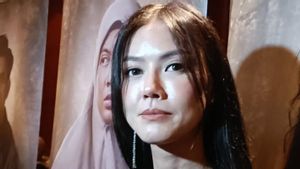JAKARTA - Sayuri, a Japanese character in Seoul who often graces South Korean screens captured her experience as a single parent in the reality shows The Return of Superman. The show often features South Korean celebrities parenting without the help of a wife.
Sayuri, who is not married, has a son named Zen through artificial insemination. Her involvement in the reality show came to attention because she was the first person to show life as a single parent on the show that aired in 2013.
As reported by Yonhap, Sayuri's daily life recorded on camera is no different from other members of "Superman", the hassle of parents in general when parenting. "I have to love her more than any other mom", Sayuri said on the show.
"I hope he doesn't feel lonely or wants anything more, even without a father".
Last November, the Japanese actress, and writer who started her entertainment career in Korea through the Global Talk Show in 2007 revealed via social media that she became the mother of a son using a sperm bank in Japan.
Sayuri decided to have children through the help of a sperm bank because she was pursued by time due to ovarian disease.
"I only had two options left at the time, immediately marry a man I didn't love and seek IVF, or give birth and raise a child alone", she said in an interview with KBS in November.
"I can't afford to choose the first".
The 41-year-old woman went to Japan because it was almost impossible for a single woman to have an IVF baby or adopt a child in South Korea.
According to Korean Society of Obstetrics and Gynecology guidelines, doctors can only perform artificial insemination on married couples, so single women cannot participate in IVF programs.
"I know it's important for a child to have a father, but it's important to accept different things as well", she said.
"I love my pet dog. We're not connected to blood, but we're a family because we spend time together.
Traditional family symbol of South Korea
Sayuri's case is a symbol of the weakening of traditional family forms in South Korea. Some conservatives argue that her choice to become a single mother could undermine the concept of a "proper" family and encourage family forms that deviate from "normal" patterns of marriage and childbirth.
But the community also supports Sayuri and says it's time to change the social concept of the family and embrace diversity. The latest statistics show a growing number of Koreans are unmarried and have children.
Based on government data, the percentage of households consisting of parents and unmarried children fell from 29.8 percent in 2019 to 37 percent in 2010. In contrast, new family types such as single-person households rose to 30.2 percent from 23.89 percent in the same period.
The number of married couples in South Korea reached an all-time low in 2020 to 214 thousand. By 2020, the number will be 326 thousand.
While the number of babies born also declined sharply, the country's total birth rate hit a record low of 0.84 last year. In addition, more and more young people are considering no need to marry.
A recent survey showed that 60.9 percent of those aged 13-24 said they should not marry, up from 49 percent in a previous poll conducted in 2017.
Against this backdrop, the South Korean government unveiled its long-term policy plan to expand the definition of family to recognize unmarried couples living together, foster families, and single-member households.
Under current law, only units established through marriage, blood, and adoption are considered family, and eligible for social welfare benefits and legal protection.
At the same time, the government will also discuss whether sperm donor access is allowed for unmarried women, after making the poll public.
*Read more information about INTERNATIONAL NEWS or read other interesting writings from Putri Ainur Islam.
Other BERNAS
SEE ALSO:
The English, Chinese, Japanese, Arabic, and French versions are automatically generated by the AI. So there may still be inaccuracies in translating, please always see Indonesian as our main language. (system supported by DigitalSiber.id)













